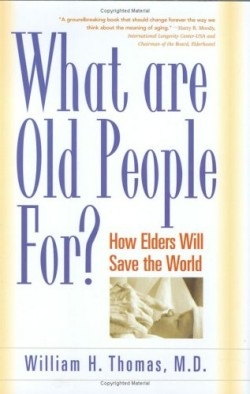What Are Old People For?
How Elders Will Save the World
Over the past century the percentage of Americans over the age of sixty-five has grown from 3.1 million to 34.5 million. As the baby boomer generation reaches retirement age, those numbers will again skyrocket.
“Declining birth rates combined with increased longevity are creating something new: old age on a massive scale,” the author writes. “The old are descending upon us by the hundreds of millions. No longer considered productive members of society, they will, nonetheless, continue to make demands on the people who must support them.”
Some planners tote up the cost and logistics of long-term institutionalized care for a significant percentage of the population, and view it as a social disaster of unprecedented proportions. Thomas, however, heralds the coming age as “one of the greatest windfalls of all time.” What it will require, he writes, is nothing short of a revolution in the way society looks at the cycle of human life. This book is the manifesto of that revolution.
Industrialized societies are in thrall to the “cult of adulthood,” Thomas maintains, and both children and elders are judged by its standards. Elders are seen as “failed adults.” The immediate and most devastating result of this view is that old age is treated as a disease, with elder care relegated solely to the medical professions. Our elders are guaranteed “access to care,” but with no provision for the needs of the human spirit.
“To be old in contemporary society is to inhabit a ghetto without borders,” he writes. “Rich or poor, man or woman, sage or fool, there is no refuge.” After a thoroughgoing indictment of the deeply ageist structure of modern life, Thomas takes readers through a short course in revisionist evolution. Why is it, he asks, that human beings enjoy such a long post-reproductive life span? What is the genesis of our longevity?
Stirring in a rich broth of myth, anthropology, and literature, he argues that elderhood is in fact crucial to the survival of our species. Thomas, an internationally recognized pioneer in the field of gerontology, is a founder with his wife, Judith Meyers-Thomas, of the Eden Alternative, an innovative approach that grants elders “liberation from the legacy of enforced dependency.” The second half of the book, which details the principles of “edenized” eldercare and presents case studies of its successful application, should be of particular interest to readers in the helping professions.
“Our culture declares that adulthood is forever, that old age means decline, and that perfection is lodged in remaining young,” Thomas writes. “The truth is that old age is difficult, but it is essential because it teaches us how to live as human beings.”
Reviewed by
Marilyn Bowden
Disclosure: This article is not an endorsement, but a review. The publisher of this book provided free copies of the book to have their book reviewed by a professional reviewer. No fee was paid by the publisher for this review. Foreword Reviews only recommends books that we love. Foreword Magazine, Inc. is disclosing this in accordance with the Federal Trade Commission’s 16 CFR, Part 255.

